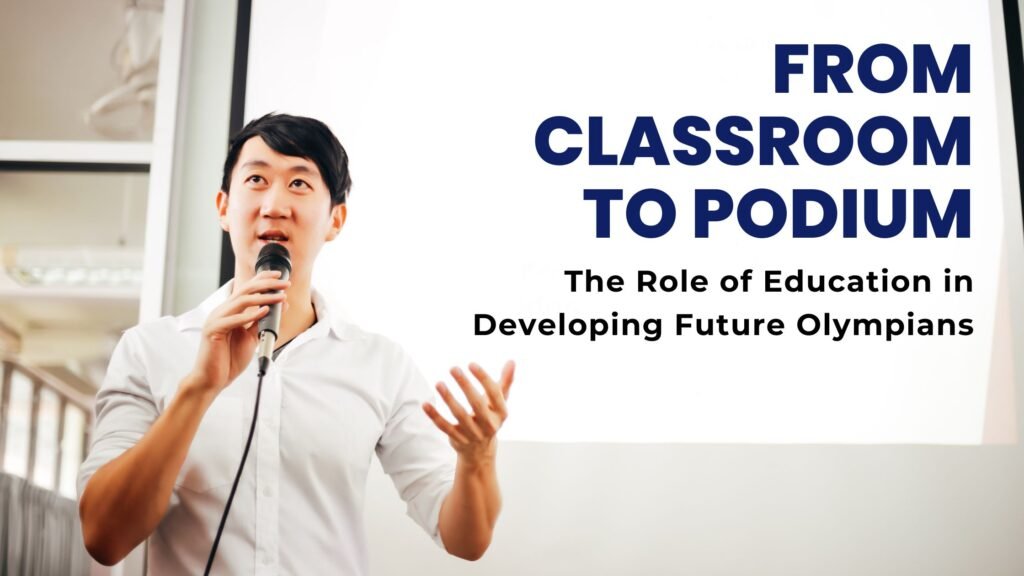When we think of Olympic medalists, we often picture intense training sessions, world-class coaches, and the relentless pursuit of physical excellence. Especially after the recent 2024 Olympics, a wave of inspiration has swept across the globe, turning the aspirations of many young minds towards athletics.
Did you know that roughly 75% of Olympians have attended college and the majority excelled in it? Surprisingly, many elite athletes credit their success not just to their physical training, but also to their academic experiences. This raises an important question: How can education systems support young athletes in balancing the demanding worlds of athletics and academics?
In this article, you can also find a clear idea about pursuing sports as a career in today’s academic-driven world, if you are a budding athlete looking for a career in sports.
The Foundation: How Education Can Shape Athletes
Education is more than just textbooks and exams; it’s about developing a mindset that prepares us for the mental and physical demands of the world. Education systems worldwide should support budding athletes and ensure they receive special attention. The coaches as well as the teachers must consult them to balance athletics and academics. For young athletes, this mindset is crucial.
Sports are as much a mental game as they are physical. To excel, athletes must be able to handle the pressures and challenges that arise in competition. Here’s where education plays a pivotal role.
After all, Education teaches resilience. Whether it’s bouncing back from a poor grade or pushing through a challenging subject, students learn to overcome setbacks. This resilience translates into their athletic careers, where setbacks like injuries or losses are part of the journey. They learn to communicate, share responsibilities, and work towards a common goal
The Role: Academic Institutions in Developing Olympians
Nowadays, Schools and universities are increasingly recognizing their role in nurturing athletic talent. They are now more proactive in creating environments where student-athletes can thrive both academically and athletically. Many institutions have introduced programs specifically designed to support this balance, ensuring that young athletes do not have to choose between their education and their sporting dreams, such as:
- Sports Scholarships: Many colleges offer sports scholarships that provide financial support for the underprivileged. These scholarships not only make higher education more accessible but also reduce the financial burden on athletes.
- Flexible Curriculums: Understanding the unique challenges faced by student-athletes, some academic institutions have introduced flexible schedules, online courses, and relaxed attendance policies. These adaptations enable athletes to continue their education without compromising their training commitments.
- Networking Opportunities: Educational institutions often provide athletes with networking opportunities, connecting them with alumni and professionals who can offer mentorship and guidance. These connections can be invaluable, providing young athletes with insights into career opportunities both within and outside the sports world.
For athletes considering their educational options, it is essential to choose an institution that offers these kinds of support systems. If you’re an athlete looking for the right educational institution, here’s a link that provides clear insights into popular universities that cater to student-athletes (link).
Real-Life Examples: Olympians Who Excelled Academically
Numerous Olympians have demonstrated that academic excellence and athletic prowess can indeed go hand in hand. These athletes serve as powerful examples of how education can enrich and enhance a sporting career.
1. Michelle Kwan: The two-time Olympic medalist in figure skating is not only a celebrated athlete but also a scholar. Kwan holds a master’s degree from the Fletcher School of Law and Diplomacy at Tufts University. She credits her education with helping her transition from the world of sports to a successful career in diplomacy, underscoring the importance of a strong academic foundation.
2. Neeraj Chopra: The Indian javelin thrower, who has won gold and silver medals at the Olympics, is a graduate of Lovely Professional University (LPU) in Punjab. LPU’s sportspersons have significantly contributed to his success in various national and international competitions.
3. Kathy Freeman: The Australian sprinter, who won gold in the 400 meters at the 2000 Sydney Olympics, holds a degree in physical education. Freeman has often spoken about the importance of education in her life, particularly in understanding the science behind her sport, which contributed to her success on the track.
The Plan B: Preparing for Life After Sports
An athlete’s career is short-lived, with most retiring in their 30s. This is where education becomes a critical asset. While some governments provide retiring athletes with jobs based on their qualifications, having a solid educational background ensures that athletes are well-prepared for life after sports.
Take, for instance, Michael Jordan, widely regarded as one of the greatest basketball players of all time. Jordan earned a degree in geography from the University of North Carolina. After his illustrious basketball career, he became a successful businessman, owning the Charlotte Hornets and launching the globally recognized Jordan brand.
End note: Striking the Right Balance
Though sports is a highly honorable and auspicious profession, aspiring Olympians must find a way to excel both academically and athletically. The demands of both can be overwhelming, requiring relentless dedication, time management, and resilience. However, while the path is undeniably challenging, the rewards are profound.
For young athletes and their parents, the message is clear: don’t neglect your education in pursuit of athletic success. These two pursuits are not mutually exclusive; in fact, they can and should go hand in hand.
Education provides a strong foundation that can enhance an athlete’s critical thinking, strategic planning, and long-term career prospects. With the right balance, the classroom can be just as important as the training ground, contributing to the development of well-rounded individuals who are prepared to succeed in all aspects of life








Leave a Reply